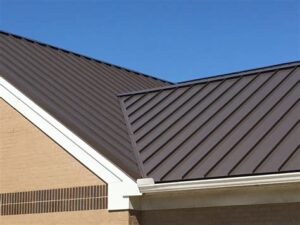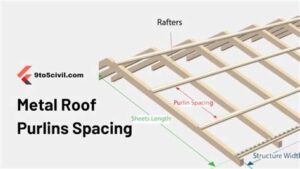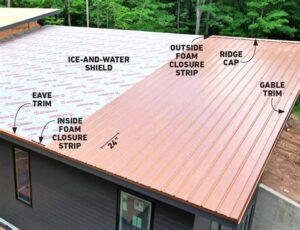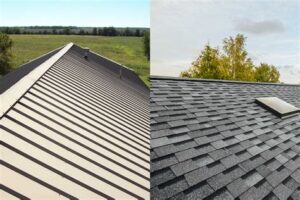Are you considering a roof upgrade that combines durability, energy efficiency, and aesthetic appeal? Metal roofing has become a popular choice for homeowners seeking a long-lasting solution for their homes. However, choosing the right metal roofing materials and ensuring an accurate fit can be challenging. This is where a Metal Roofing Calculator comes into play. This invaluable tool not only simplifies the process of estimating costs and materials but also empowers you with expert insights to make informed decisions. In this article, we’ll explore what a Metal Roofing Calculator is, the key inputs needed for precision, the best materials to elevate your home’s design, common pitfalls to avoid, and how to analyze your results for optimal outcomes. Transform your home with ease and let’s dive into the essential tips you need to get started!
What Is a Metal Roofing Calculator and Why Use It?
A metal roofing calculator is a valuable tool designed to assist homeowners and contractors in estimating the materials and costs associated with installing a metal roof. This online or software application simplifies the planning phase, allowing users to input specific parameters, such as roof dimensions, pitch, and chosen metal type, to receive accurate estimates. Utilizing such a calculator is essential for several reasons:
- Cost Estimation: By using a metal roofing calculator, you can gain insights into the overall expenses, including materials, labor, and potential waste, which aids in budgeting effectively.
- Material Selection: The calculator helps identify the appropriate type of metal roofing— like steel, aluminum, or copper—based on the specific requirements of your project.
- Precision: Accurate measurements and calculations reduce the chances of over-ordering or under-ordering materials, saving time and money in the long run.
- Design Planning: It assists in visualizing how different materials and styles would look on your home, enabling better design decisions.
Incorporating a metal roofing calculator into your planning process is crucial for transforming your home efficiently and cost-effectively. By leveraging this tool, you ensure that your metal roofing project is well-planned, ultimately enhancing the aesthetic and functional value of your property.
Key Inputs You Need for Accurate Metal Roofing Calculations
To effectively transform your home with metal roofing, a reliable calculator is essential. However, the accuracy of your calculations greatly depends on the inputs you provide. Here are the key elements you need to consider when using a metal roofing calculator:
- Roof Area: Measure the total area of your roof, including any slopes or overhangs. This is typically measured in square feet.
- Roof Pitch: Understanding your roof’s angle is crucial, as it affects both the materials needed and the overall cost. Use a pitch measurement tool or consult a professional for accuracy.
- Material Type: Different types of metal roofing materials (such as steel, aluminum, or copper) have varying costs and weight. Be precise about the material you plan to use.
- Location: Your geographic location can influence the type of roofing required, as well as shipping costs and availability of materials.
- Underlayment and Accessories: Don’t forget to add costs for underlayment, flashing, and other accessories that may be necessary for installation.
- Installation Method: Will you be installing the roof yourself or hiring professionals? This will impact labor costs if applicable.
By carefully inputting these key elements, you can ensure that your calculations are both comprehensive and accurate, thereby allowing you to make informed decisions as you transform your home with metal roofing solutions.
Transform Your Home: Identifying the Right Metal Roofing Materials
Choosing the correct materials for your metal roofing project is crucial for ensuring durability, aesthetic appeal, and overall performance. Here are some key factors to consider when identifying the right metal roofing materials:
| Material Type | Pros | Cons |
|---|---|---|
| Steel | Affordable, strong, and available in various styles | Prone to rust if not properly coated |
| Aluminum | Lightweight, corrosion-resistant, and ideal for coastal areas | More expensive than steel |
| Copper | Long lifespan, unique aesthetic, and low maintenance | High cost and can be prone to tarnishing |
| Zinc | Environmentally friendly and durable, with self-healing properties | Expensive and requires skilled installation |
When choosing a metal roofing material, consider the local climate and your home’s architectural style. Additionally, it’s essential to focus on the transform your home’s overall design and how specific materials can enhance its visual appeal. Factors such as color, sheen, and texture will play a significant role in your final decision.
Moreover, consult with professionals and seek samples to better understand your options before making a purchase. This approach will help ensure that you select the best metal roofing material to transform your home effectively.
Common Mistakes to Avoid When Using a Metal Roofing Calculator
Using a metal roofing calculator can significantly transform your roofing project, but there are common pitfalls to avoid. Here are some key mistakes that can lead to inaccurate outcomes and unnecessary expenses:
By being aware of these common mistakes, you can better utilize a metal roofing calculator and truly transform your home’s roofing experience.
How to Analyze Results for Optimal Roofing Decisions
When you’ve input all necessary data into the metal roofing calculator, the real work begins by interpreting the results. Analyzing these results is crucial for making informed decisions that truly transform your home. Here are some key factors to consider:
1. Cost Analysis: One of the first results you’ll see will usually relate to cost. Compare the total projected cost to your budget. This includes materials, labor, and any additional fees. Ensure that the quotation aligns with your financial expectations without compromising on quality.
2. Material Choices: The calculator may provide options for different types of metal roofing materials. Understand the benefits and trade-offs of each option, such as durability, aesthetic appeal, and potential energy savings, to choose what best fits your goals in transforming your home.
3. Area Coverage: Double-check the square footage calculated. Ensure it matches the actual measurements of your roof. If there’s any discrepancy, you may need to redo some calculations or take more precise measurements to avoid excess costs.
4. Installation Insights: Some calculators will indicate the complexity of installation based on your roof’s shape and pitch. Make sure to consider these factors when analyzing the time and costs associated with the project.
5. Return on Investment (ROI): Analyze the long-term benefits versus the upfront costs. A higher initial investment may pay off in terms of energy efficiency and longevity. Make sure to factor this into your decision-making process.
6. Weather Considerations: Look into how your selected materials hold up against local weather conditions. The calculator can assist in selecting materials designed for your climate, ensuring your investment provides durability and reduces maintenance costs.
By thoroughly analyzing your metal roofing calculator results, you can make well-informed decisions that will significantly transform your home while aligning with your budget and aesthetic preferences.
| Factor | Considerations |
|---|---|
| Cost Analysis | Compare total projected costs with your budget |
| Material Choices | Evaluate durability, appearance, and energy efficiency |
| Area Coverage | Ensure accuracy of roof measurements |
| Installation Insights | Understand complexities impacting cost and time |
| Return on Investment | Weigh long-term benefits against upfront costs |
| Weather Considerations | Select appropriate materials for local climate |
Frequently Asked Questions
What is a metal roofing calculator and how does it work?
A metal roofing calculator is a tool that helps homeowners estimate the cost, materials, and labor required for a metal roofing project. Users input dimensions of their roof, and the calculator provides an estimate based on current prices and material selections.
What are the benefits of using a metal roofing calculator?
Using a metal roofing calculator can save time and money by providing accurate estimates, helping to avoid over-ordering materials, and ensuring a more precise budget for the roofing project.
Can I use a calculator for different types of metal roofing?
Yes, most metal roofing calculators accommodate various types of metal roofing materials, including standing seam, corrugated, and four different profiles, allowing you to compare costs and benefits.
How accurate are the estimates provided by a metal roofing calculator?
Estimates from a metal roofing calculator are generally accurate if the user inputs precise measurements and considers local material prices. However, it’s advisable to consult with a contractor for a final quote.
What factors should I consider when using a metal roofing calculator?
Consider factors such as roof pitch, square footage, material type, labor costs, permits, and any additional features like underlayment and flashing when using a metal roofing calculator.
Is it possible to integrate a metal roofing calculator into my website?
Yes, many companies offer APIs or plugins for integrating roofing calculators into websites, enhancing user engagement and providing a valuable tool for potential customers.
Are there any tips for choosing the right metal roofing material when using the calculator?
Look for materials with a good balance of durability, warranty, visual appeal, and cost-effectiveness. Consulting with a professional can also help ensure you make the best choice based on your local climate and building codes.





